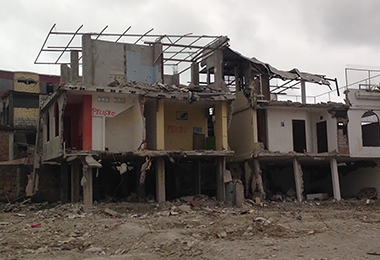[vc_row][vc_column][vc_column_text]
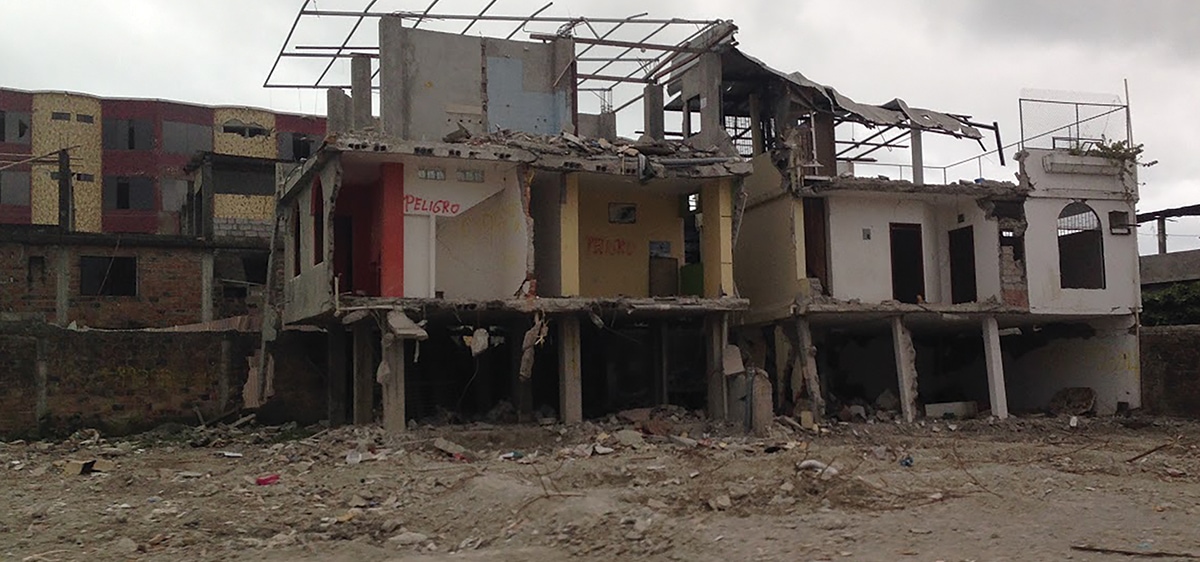
[/vc_column_text][/vc_column][/vc_row][vc_row el_class=”hero-header-text”][vc_column][vc_column_text]
Unshakable
In the aftermath of last year’s devastating earthquake, a Covenant church in Ecuador became a lifeline to its community.
by Erik Amundsen | April 17, 2017
[/vc_column_text][/vc_column][/vc_row][vc_row][vc_column][vc_column_text]
Imagine that while you are reading this article, an earthquake hits. Things start falling from above. The walls begin to collapse around you, the power cuts out, everything becomes dark. Your children, where are they? People are trapped. Cell phone towers are down, roads are blocked. Water pipes and sewer lines are broken, and very soon local stores will be looted, their shelves emptied. What do you do? Where do you turn?
[/vc_column_text][vc_column_text]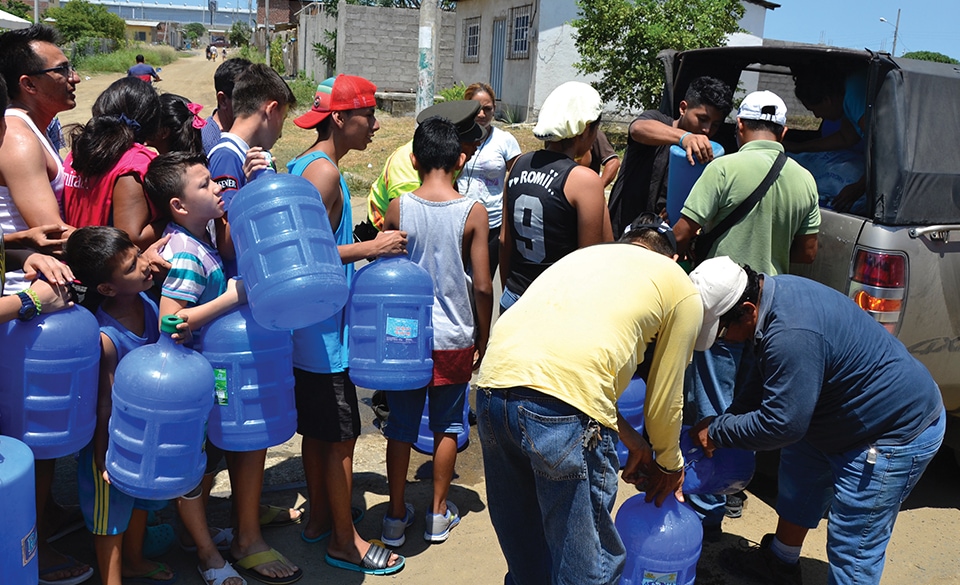 [/vc_column_text][vc_column_text]
[/vc_column_text][vc_column_text]
One year ago on April 16, a 7.8 earthquake ravaged the coast of Ecuador. For fifty-three never-ending seconds the earth heaved, and rigid concrete structures twisted, shattered, and crumbled under the unforgiving force of the quake. Within the first twenty-four hours, fifty-five aftershocks occurred, with thousands more following in the ensuing days and weeks. Each aftershock caused some residents to experience flashbacks of the initial trauma.
Twenty-six thousand people instantly became homeless, 16,000 people were injured, and even though the official death count is 673 people, most survivors think the real number is in the thousands. After large disasters, statistics like these seem a feeble attempt to quantify the anguish and torment that is reality for those at ground zero. Apart from the physical loss, many people remain traumatized from the experience.
Enough time has passed for those removed from the situation to forget it even happened. But for thousands of people in Ecuador, life has barely begun to return to the way it once was.
Thousands still live in temporary government tent camps and receive help from non-government organizations as well as the government. Others live in makeshift structures under old billboards eating whatever they can find. Many have received no aid and do not believe that help is coming.
In the midst of so much pain and despair, the Ecuador Covenant Church (IPEE) immediately began mobilizing volunteers who gave sacrificially to help alleviate the suffering of the affected communities. A dedicated team met daily in the IPEE offices in Quito to coordinate sending water, food, medicine, and clothes to be distributed by Covenant churches on the coast hours away.
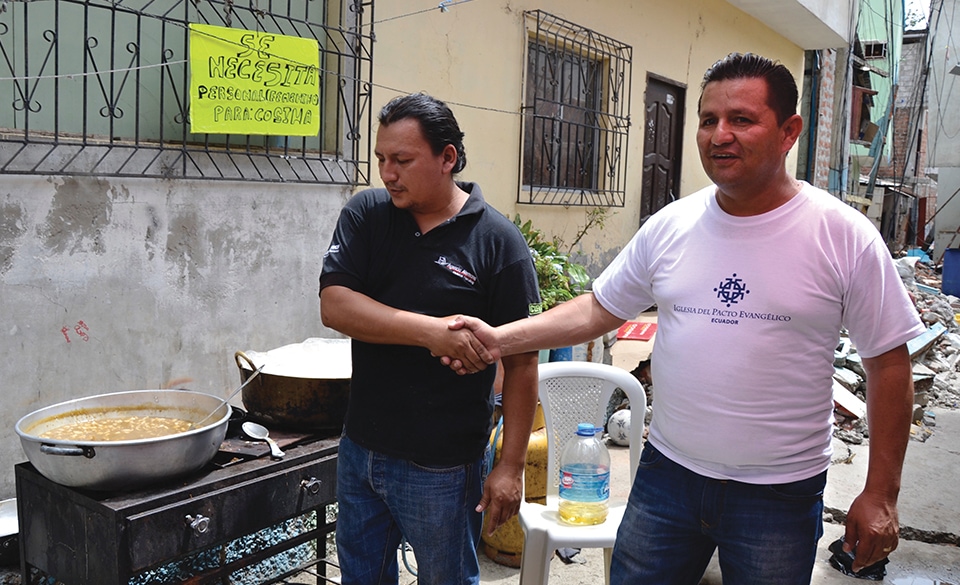
In the port city of Manta, 120 miles from the epicenter, La Victoria Covenant Church has been particularly responsive. With more than 200,000 inhabitants, Manta is the fifth largest city in the country, and the most populated area hit by the earthquake. Entire city blocks were destroyed, including the commercial district.
The morning after the earthquake, La Victoria church members said, “We need to help our neighbors.” So they pooled their money and bought $65 worth of water to hand out. Within minutes, it was gone. By the end of the day no water or supplies were available for purchase, even for those who had money.
The church prayed again, asking, “God, we want to help these people. Give us water.” Within twenty-four hours trucks began arriving from other cities bringing water to the area. A local water purification plant that had survived the earthquake offered to purify water for distribution for free. So a member of the church offered his seven trucks and all of his employees to work for a week carrying clean water to communities that needed it.
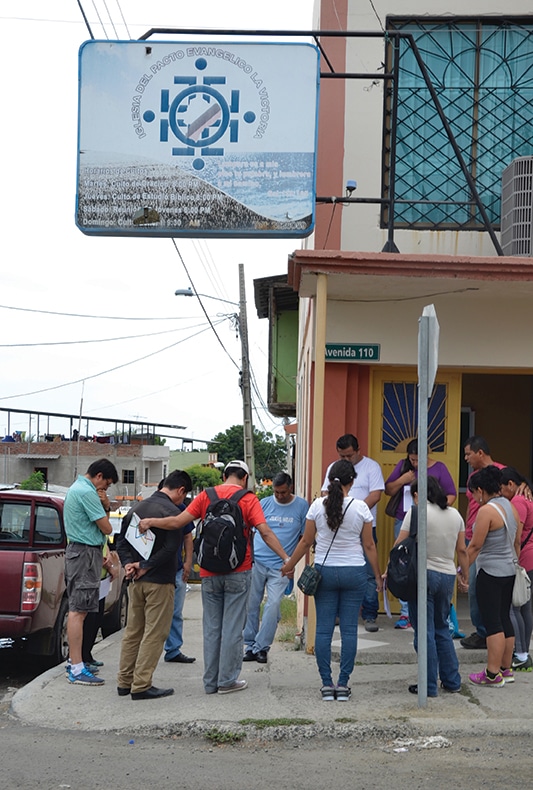
La Victoria has about 200 members. Although they have few resources, they met with community leaders to find out which neighborhoods had not received aid. They pinpointed three key areas that desperately needed help. Pastor Walther Vallejos visited the communities and saw that they needed food. So they prayed, “God we want to feed these people. Give us food.” Soon food began arriving in trucks from Quito. An organization called Peace and Hope International from New York had heard about the good work they were doing and offered enough money to buy breakfast for 150 women, children, and elderly people for one month.
In a modern-day loaves and fish story, God multiplied that gift, and La Victoria was able to provide daily meals for 230 people—far beyond the initial number of 150. Whenever resources began to run low, money would miraculously appear in their account, thanks to generous donors from around the world and partners such as Covenant World Relief. Volunteers from around Ecuador came to help, and congregations took up offerings of money or food to help provide these meals.
At first a core group of thirty-five volunteers from the church shopped, prepped, cooked, distributed food, and washed dishes every day. They prepared the food at the church and then brought it to serve on the street where the people were living. Once they had formed relationships, they invited the people they were serving to participate in the work and this became an important part of their ministry.
Spending time working together, the volunteers were able to grieve with those who had lost everything. When people saw the selfless way that church members were serving them, they wanted to be a part of it. For many it was the first time they had been inside an evangelical church.
Jorge Teran lost his house and his business in the earthquake. It was Saturday evening, and he was at home with his family when their home began to shake. They all ran out the front door to the alley. As they ran, the three-story building next door toppled over against their house. Just as concrete began to hit the ground, Jorge grabbed his family and ducked into a metal doorway, which saved their lives. Once the earth had stopped moving, they went straight to work digging out neighbors who were trapped in the collapsed buildings.
Theirs was a low-income community where most residents didn’t have the deed to the land they lived on. Most of the residents opted not to move into the government camps after the quake for fear of losing their land. Jorge rallied the community and became an advocate, representing the people and working to help them keep their land. He built strong relationships with La Victoria members, and because he had experience working as a cook on a ship, he helped them prepare the meals.
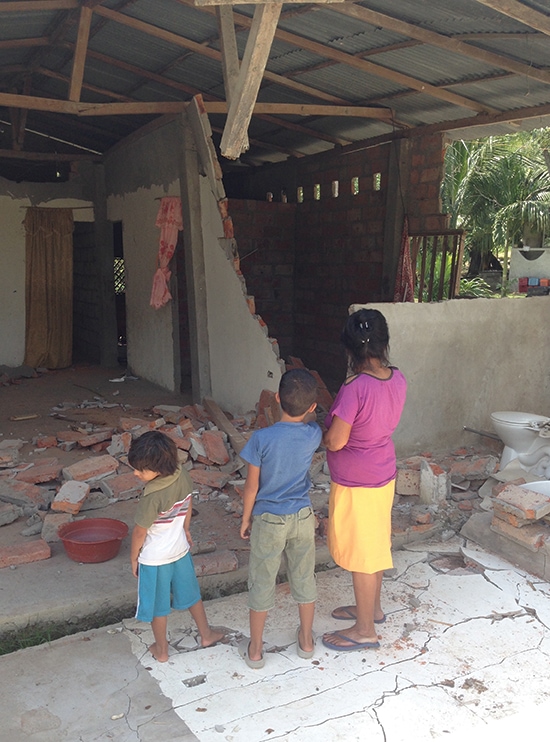
Months after the earthquake, when asked what his plan was for the future, Jorge blankly stared into the sky and was quiet for a long time before saying, “It’s hard to imagine a future at all when we have nothing.” He added that many people who lost family members, houses, and businesses wish that they also would die and be released from their suffering.
In the midst of these feelings of despair, La Victoria is offering a message of hope. Every week new people show up to their Sunday services—so many that everyone can’t fit in the sanctuary. The church has started holding worship services and small groups on the streets in the most affected areas. Three different groups of about forty people are now meeting on a regular basis.
The church has also organized therapy sessions for people who are grieving, with special attention paid to kids. When members of the church saw that children were confused and hurting but their parents could not give them the attention they needed, they started a ministry called Laughter Therapy. They dressed as clowns and hosted events with balloon animals, snacks, and shows for children. It was a distraction from their stressful situations and gave children a chance to run around, laugh, and be kids again. They followed up these visits with specialists who do therapy with children using drawings, games, and their imagination to work through their emotions.
Even after months of hard work and sleepless nights, La Victoria has not lost its desire to walk with its neighbors. Now Covenant World Relief is providing funding for a long-term recovery project in Manta to be implemented by the church. The project is focused on economic recovery. Those who have lost their livelihoods are receiving training and small grants to start small businesses such as restaurants, mini-markets, beauty salons, and a motorcycle parts store. Through the creation of businesses, the once-devastated community is rebuilding so that families can sustain themselves and the community can flourish.
David Husby, director of Covenant World Relief, says, “Recovery after such a major disaster as this earthquake will take years. I am thankful for the partnership between the ECC and our sister Covenant Church in Ecuador. We will be able to collaborate in this recovery in the months and years to come. We in the ECC have much to learn from how IPEE has responded to this disaster and how they continue to engage in long-term recovery and development of earthquake ravaged communities.”
Today there are signs that life is starting over. The sounds of heavy machinery, power tools, music, and street vendors fill the air. The noise is a sign that life continues, that people move on.
Pastor Vallejos and La Victoria Covenant Church say they are thankful to everyone who has given to make this work possible. They ask for continued prayers for the victims and especially for the children. A phrase that is common among Covenant churches in Ecuador is “Juntos somos mas,” or “Together we are more.” Alone no one could have made the difference for so many who suffered from the earthquake. Together working as God’s people we can be the love of Christ to others.
[/vc_column_text][vc_column_text]
Covenant World Relief continues to partner with La Victoria Covenant Church in the long process of rebuilding its community. To help their efforts go to covchurch.org/ecuadorearthquake.
[/vc_column_text][/vc_column][/vc_row]


